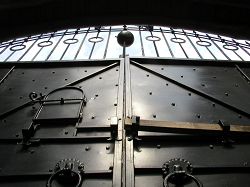International Panorama
All White in Barking
Marc Isaacs / UK / 2007 / 73 min / English
What happens when an xenophobic elderly couple is invited to dinner by their immigrant neighbours?
The inhabitants of the London suburb of Barking are having trouble accepting the influx of ten thousand immigrants from around the world. Long–time local residents Susan and Jeff don't even greet their Nigerian neighbours, because they are "not like them". Dave has become a British National Party activist fighting for a white Barking, even though both of his daughters are in relationships with just the kind of people he rants against. By contrast, Jewish Holocaust survivor and boutique owner Monty has an unusual relationship with Betty, a black nurse. Using unexpected humour, All White in Barking allows the long–term residents and their new, culturally different neighbours to air their views. Director Marc Isaacs refrains from being judgmental, but instead attempts to understand the logic of a fast–transforming community and the sometimes grotesque overcoming of the psychological barriers between cultures. The residents' words inadvertently reveal a xenophobic outlook rooted in ignorance and a sense of being threatened.
producer: Rachel Wexler
editor: David Charap
camera: Marc Isaacs
music: Michel Duvoisin
production info:
Rachel Wexler
Bungalow Town Productions Ltd
rachel@bungalow-town.com
tel: +44 (0) 7710 477 407
www.bungalow-town.com
selected filmography:
Philip and His Seven Wives, 2006 / Someday My Prince Will Come, 2004 / Calais The Last Border, 2003 / Travellers, 2002 / Lift, 2001 / Everyday Thieves, 2001
Alone in Four Walls / Allein in vier Wänden
Alexandra Westmeier / Germany / 2007 / 85 / Russian
Teenage criminals in a correctional facility in countryside Russia. Law, order and hygiene – only childhood is missing.
Alexandra Westmeier explores the lives of juvenile felons aged 10 to 14. In Russia, lawbreakers can be tried and convicted as adults at the age of fifteen; younger offenders are given reduced sentences and sent to juvenile detention facilities. Some of the inmates we meet are serving time for theft, some for murder. “They’re animals, not children” – cries out the mother of a murdered teenager. But are they? The director provides glimpses of their home lives, and we begin to realize that, for these children, a correctional facility is sometimes an easier place to be. They are children who never had a childhood and who often take pride in permanent reminders of their criminal pasts: This tattoo means ‘alone among friends’, this one is ‘alone in four walls’ and this star is ‘I’ll never fall on my knees in front of a cop’, says one. Filmmaker Alexandra Westmeier spends enough time with them to see the scared boys beyond the appearance of ‘hard men’. As the merciless statistic shows, over 90% of them will get behind bars again.
producer: Inigo Westmeier, Alexandra Westmeier
editor: Alexandra Westmeier
camera: Inigo Westmeier
sound: Titus Maderlechner
production info:
Linger On Filmproduction
Inigo Westmeier
Roennestrasse 8
14057 Berlin, Germany
tel: +49 30 81614253
www.lingeron.com
info@lingeron.com
filmography:
Mama, mir geht es gut, 2007

Anna, 7 Years on the Frontline
Masha Novikova / Netherlands / 2008 / 78 min / Russian
On October 7, 2006, journalist and activist Anna Politkovskaya was murdered in the hall of her Moscow apartment. Her colleagues started their own investigations to find out who killed Anna.
This film is about Anna Politkovskaya, Russian journalist who won international recognition for reporting work on the conflict in Chechnya in which she sought to expose human rights abuses. She spent seven years on the frontline, often in extremely dangerous situations. Anna Politkovskaya was murdered in Moscow on October 7, 2006. This film is about a woman who felt very lonely, but could never stop doing what she did. To understand Anna's personality, her work and duties, as much as her fears and feeling of loneliness, we meet her friends and colleagues who stood by her during hard times. Galina Musaliyeva shared a room with Anna in the editorial office of Novaya Gazeta for the last seven years. Lidia Yusupova is a lawyer from Grozny searching for the lost people in Chechnya. Svetlana Gannushkina, Chairman of the Committee "Civil Assistance" and a Board Member of Memorial Human Rights Center, has also worked with Anna helping fugitives and emigrants from the former Soviet Union republics. Vyacheslav Izmailov, another colleague of Anna from Novaya Gazeta, started his own investigations, trying to find out who killed Anna.
producer: Sasha Ourikh
editor: Lena Rem
camera: Lidia Yusupova, Zarema Mukusheva, Igor Minakov
sound: Masha Novikova, Rob Brouwer
production info:
NOVDOC
Sasha Ourikh
Frans de Wollantstraat 18
1018 SC Amsterdam
The Netherlands
tel: +31 619 34 83 30
sasha@novdoc.nl
www.novdoc.nl
sales info:
Deckert Distribution GmbH
Marienplatz 1
04103 Leipzig
Germany
tel: +49 (0)341 215 66 38
fax: +49 (0)341 215 66 39
info@deckert-distribution.com
filmography:
Kasparov's Andere Rusland, 2008 / In Memoriam, Aleksander Litvinenko, 2007 / Between Heaven and Earth, 2007 / Drie kameraden, 2006

Bad Blue Boys / Panj pun olova
Branko Schmidt / Croatia / 2007 / 28 min / No dialogue
Family dinners, outings with friends, machine gun fire, and secret bullet-making: the daily routine of a Croatian war veteran. A testament to the lasting effects of war. The daily life of a man aged 35, married, with three children. He joined Croatian Army at the very beginning of war, and was not discharged until the very end. Now he is unemployed in Zagreb, and tries to live “like others” – sharing meals with his family, toiling in his workshop, outings with friends. Even so, his routine might seem somewhat unusual. Suffering from Post-Traumatic Stress Disorder, disregarded by society and government, together with two fellow veterans he does things that other people find bizarre, even crazy, but which help them to find peace and preserve the appearance of “normal” Croatian citizens. This film speaks about the problems of Croatian war veterans whose condition and needs are understood only by few. A faceless confession of pain and a testament to the profound and lasting effects of war.
producer: Anita Juka
editor: Vesna Lazeta, Hrvoje Mrsic
camera: Dragan Ruljancic
sound: Damir Tepes
production info:
4 Film Ltd.
Bauerova 6
10 000 Zagreb, Croatia
tel: +385 1 4828-774
fax: +385 1 4828-775
office©4film.hr
selected filmography:
Mass for the New Life, 1998 / Six Seconds for Life, 1992 / Memento of Vukovar, 1993
The Biggest Chinese Restaurant in the World
Weijun Chen / UK & Netherlands & Denmark / 2008 / 80 min / Mandarin
5000 seats, nearly 1000 staff - including 300 chefs. The West Lake Restaurant in Changsha, China, holds the title of the world's largest restaurant. So what’s on the menu? With an official plaque to prove it, The West Lake Restaurant in Changsha, China holds the title of the world's largest restaurant. With a staff of nearly 1000 - including 300 chefs - and 5000 seats, West Lake is a combination mini-theme park and eatery, featuring live entertainment and landscaped pools and pavilions. Overseeing the enterprise is its savvy and energetic owner, Qin Linzi, who uses military efficiency and martial songs to motivate her employees. "Solidarity equals strength, strength is iron, strength is steel," they sing listlessly, while Mrs Qin enthusiastically leads from the front, zealously promulgating her own version of Chinese socialism. Her customers are newly wealthy Chinese busy throwing big budget banquets - a wedding, a parent’s seventieth birthday and a baby’s one month welcome party. Outside the walls of the restaurant we also meet the lower classes who make all of this wealth possible. The girls from poor families with little choice but to work cheap, especially if, as one of the protagonists casually mentions, her father was jailed because she was a second child. The contradictions of this world are plentiful yet glibly accepted by all involved. A fascinating microcosm of contemporary China.
producer: Lawrence Elman
editor: Jean Tsien
camera: Weijun Chen
sound: Peter Hodges
music: Nick Fyffe
production info:
Drive Thru Pictures
Apollo Workspace, Unit
18 All Saints Road, London W11
tel: +44 207 229 2989
fax: +44 207 243 6310
izzy.fraser@drivethrupictures.com
selected filmography:
Please Vote for Me, 2007 / To Live Is Better than to Die, 2003 / The Evolution of the City, 1999 / Footprint, 1996

Blind Loves / Slepe lásky
Juraj Lehotský / Slovakia / 2008 / 77 min / Slovak
A sensitive and powerful reflection on the most intimate feelings and emotions of blind people. Winner of the Art Cinema Award in Cannes 2008.
To find one’s true calling and happiness in this world is hard enough for those of us who can see. How much more difficult is it for the blind? Blind Loves is a sensitive and powerful reflection on the most intimate feelings and emotions of blind people. Peter, a music teacher at a school for the blind, and his wife, Iveta, live in a tiny apartment, but simultaneously occupy a vast and amazing imaginary world. Miro and the partially sighted Monika are in love, but their relationship is complicated by her parents' objections to Miro's Romany ethnicity. Elena and Laco are expecting a baby – and their fears, hopes and dreams for their unborn child are magnified by the fact that they are both blind. Then there is fourteen-year-old Zuzana who, like any teenager, spends hours in online chat rooms and longs to fall in love. She is about to start high school, where she will be the only blind student, and worries that she will have trouble fitting in with the other teens. Each of these individual's stories offers a uniquely tender and humorous perspective on the world.
producer: Marko Škop, Ján Meliš, František Krähenbiel
editor: František Krähenbiel
camera: Juraj Chlpík
sound: Marián Gregorovič
production info:
Artileria
Drobného 23
84101 Bratislava
artileria@artileria.sk
www.artileria.sk

Brides of Allah / Sahida
Natalie Assouline / Israel / 2008 / 76 min / Hebrew & Arabic
What makes a mother of five risk a life term for transporting a suicide bomber? A glimpse into the lives and motivations of women in prison for involvement in terrorist attacks in Israel.
A poignant chronicle of the lives of women serving time in prison for involvement in terrorist attacks in Israel. Filmed over the course of two years, the film strives to uncover the motivations behind the actions of these women. We share their daily prison lives, giving birth, meeting families, attending classes, and gossiping about clothes. One woman coyly describes wanting to blow up a hospital which treated her for severe burns following a kitchen accident, even though the Israeli doctors were kind. Another cuddles her son and says she wanted to destroy an Israeli kindergarten. Yet another, a mother of five, is serving three life terms for transporting male suicide bomber, who is told killed pregnant women but shows no signs of retraction. We hear of religious ideology, but also of discrimination and despair in the world these women come from. A journey into the world where the greatest cruelty lurks beneath the most striking beauty, where a lullaby whispered lovingly in a baby's ear echoes with the sting of hatred, and where compassion and cold blooded disdain live together behind the same penetrating eyes. A moving film full of contradictions.
producer: Talia Kleinhendler, Ayelet Ephrati
editor: Sarah Salomon
camera: Natalie Assouline, Gonen Glazer, Asher Ben Yair, Avigayil Sperber
sound: Ronen Nagel
music: Ophir Leibovitz
production info:
Pie Films Ltd., Tel Aviv
Ephrati Productions, Tel Aviv
25 Nachmany St. Tel Aviv - 65794, Israel
tel: +972-3-5280836
email: talia@piefilms.co.il
sales info:
First Hand Films GmbH
Fritz-Heeb-Weg 5, 8050 Zürich, Schweiz
tel: +41 44 312 2060
fax: +41 44 312 2080
esther.van.messel@firsthandfilms.com

Campaign! The Kawasaki Candidate / Senkyo
Kazuhiro Soda / Japan & USA / 2007 / 53 min / Japanese
Go to the nearest sidewalk with a microphone and amplifier, and start campaigning. An amusing look at Japanese democracy.
In the fall of 2005, 40-year-old, self-employed Kazuhiko “Yama-san” Yamauchi’s peaceful, humdrum life was turned upside-down when Liberal Democratic Party selects him at the last minute as its official candidate for a place on the Kawasaki city council. With zero experience in politics and without the support of voters, Yamauchi has one week to prepare for an election critical to the future of the party and his own life. He visits social events, meetings with pensioners, bus stations and stops, shaking hands with all he meets. Can a candidate without either political experience or charisma win in elections? The film presents a humorous view of political strategy, values and tradition in contemporary Japanese society.
producer: Kazuhiro Soda
editor: Kazuhiro Soda
production info:
Kazuhiro Soda
25–90 35th Street #4H
Astoria, New York
11103 U.S.A.
tel: +1 917 586 8620
soda@laboratoryx.us
www.laboratoryx.us

Citizen Havel / Občan Havel
Pavel Koutecký & Miroslav Janek / Czech Republic / 2008 / 120 min / Czech
Subtitled 'Scenes from the Presidential Kitchen' and shot over the period of 13 years, the film takes us behind the scenes of the political and private dramas of Václav Havel.
Subtitled Scenes from the Presidential Kitchen, the film takes us behind the scenes of the political and private dramas of Václav Havel's years as president. It captures the former dissident in a great variety of situations: both in political negotiations and in moments when he is not usually before the media, for instance cursing the stitching on a shirt. Among the truly unique events captured on film is Bill Clinton's State visit to the Czech Republic in January 1994, including the private part of the visit in the Reduta jazz club in Prague. Other events are the death of Havel's wife Olga and her funeral in January 1996, the celebration of his 60th birthday in the Archa Theatre, Prague, in October 1996, the forming of the new governments after the elections of 1996, 1998, and 2002, and the preparations for, and course of, the historic 2002 NATO Summit in Prague. We see Havel among friends and colleagues, with world and Czech politicians, even with the Rolling Stones. In the course of 13 years the crew has filmed 45 hours of images and recorded 90 hours of sound material. A truly unique look into events in a country’s transition to democracy.
producer: Pavel Strnad
editor: Tonička Janková, Martin Steklý
camera: Stano Slusny
production info:
Pavel Strnad
NEGATIV S.R.O.
Ostrovní 30, Praha 1
110 00 Czech Republic
tel: +420 224 933 755
fax: +420 224 933 472
pavel@negativ.cz
www.negativ.cz
selected filmography:
Pavel Koutecky, Citizen Havel, 2008 / Sweat and Tears - The Making of the Prague Spring, 2006 / It's a Prague Spring Every Year, 2005 / The Solid-Point Seekers, 2001
Miroslav Janek, Citizen Havel, 2008 / Vierka or The Mystery of Family B's Disappearance, 2005 / Battle For Life, 2000 / Hamsa, I Am, 1998

Cold Waves / Razboi pe calea undelor
Alexandru Solomon / Romania & Germany & Luxembourg / 2007 / 108 min / Romanian
An earthquake, three mysterious deaths, and a bomb attack. The puzzling story of the Romanian section of Radio Free Europe.
An original look at the Cold War through the story of the Romanian section of Radio Free Europe. While socialist propaganda had less and less to do with reality, in thousands of houses across Romania, like in other Eastern European countries, millions of people listened to Radio Free Europe in secret. On the other side of the Wall, in Munich or Paris, the Radio personnel listened too. They were hunting any information coming out of the country, meeting immigrants or tourists, receiving secret messages and scanning the Romanian press for hidden hints. But soon they found themselves to be hunted in a more violent way. In Bucharest, a special unit called the “Ether group” was set up in the Romanian secret police in 1980. While the Romanian population was lead by fear, the Romanian leaders were themselves afraid of Radio Free Europe. So they decided to silence the Radio for which Ceausescu employed Carlos the Jackal. An eccentric alliance was thus forged, between a national-communist dictator and international terrorists. They placed bombs at RFE’s Munich headquarters, editors were attacked in Germany and France, and three of the directors died after being X-rayed. The film not only digs up unknown facts from the past, it also addresses the issue of propaganda in today's society.
producer: Alexandru Solomon
editor: Catalin Cristutiu
sound: Cristi Tarnovetchi
production info:
Elvira Geppert,
tel: +49 30 7800 1403,
fax: +49 30 7870 3891
Geppert_Productions@t-online.de
sales info:
Paul Thiltges Distributions,
tel: +352 25 03 93 – 1
fax: +352 25 03 94
pthiltges@ptd.lu
www.ptd.lu
filmography:
Clara B., 2006 / Great Communist Bank Robbery, 2004 / Sweet Bread of Exile, 2002 / The Man with 1000 Eyes, 2001 / Dog's Life, 1999

Crime and Punishment / Zui yu Fa
Zhao Liang / China & France / 2007 / 123 min / Mandarin
Ambitious units fight crime in a remote part of China with often confused and grotesque results.
An insightful portrait of everyday life of a Chinese border police station. Reinforced units fight crime, though the results are often confused and grotesque despite the diligence of the inexperienced young officers. A mentally ill man calls them out over a "corpse" he has found in his bed which turns out to be a crumpled duvet. Another man suspected of robbery cannot be made to answer questions, even using violence, because he is most likely dumb. The long and penetrating shots of director Zhao Liang gradually uncover human stories from a China that is both regimented and rapacious. This witty picture, whose comedy often has a chilly edge, provides us with an insight into how the social structure is influenced by omnipresent police repression.
producer: Sylvie Blum
editor: Zhao Liang
camera: Zhao Liang
production info:
No.155, Caochangdi
Chaoyang District
Beijing, 100015 China
tel: +86 136 011 683 24
dearliang2001@yahoo.com.cn
selected filmography:
Farewell Yuan Ming Yuan, 2006 / City Scene, 2005 / Return to the Border, 2005 / Paper Air Plane, 2001
Divorce Albanian Style / Razvod po Albanski
Adela Peeva / Bulgaria / 2007 / 66 min / Albanian & Russian & Polish
After the divorce of Albania from Soviet Russia, Enver Hodja’s regime hunted down men and women married to foreign nationals, accusing them of espionage. Three couples thus separated tell their story.
This story of love and separation takes place in the surreal world of 1960s communist Albania. Film’s protagonists reveal the experience of the many thousands of families that were forcibly separated by the totalitarian regime of Enver Hodja, the longest-serving European dictator of the 20th century. In 1961, Enver Hodja broke off Albania’s relations with the Soviet Union. Albanian men married to foreign women were forced by the state to split from their wives who were subsequently expelled.The official reason was alleged espionage. Hojda quickly created a mechanism to deal with those who refused to leave. KGB-trained secret police collected “evidence,” minor clerks became “investigators,” carpenters were made into prosecutors and labor camps expanded. The women who stayed – and their husbands - spent years in prisons, the last released in 1987. Divorce Albanian Style tells the stories of three of these couples, and of the apparatchiks and officers of the secret police who changed their lives forever.
producer: Adela Peeva
editor: Jelio Jelev, Diana Zaharieva
camera: Joro Nedelkov
sound: Yuri Colov, Michal Pruski, Ivaylo Yanev
production info:
Adela Media
Adela Peeva
1164 Sofia, Bulgaria
3, Babuna planina str.
tel.: + 359 2 862 65 72
fax: + 359 2 962 47 89
e-mail: adelamedia@adelamedia.net
www.adelamedia.net
selected filmography:
Whose is this song? 2003 / Born from the Ashes, 2001 / The Unwanted, 2000 / The Right to Choose, 1998 / In the Mountain of Bulgaria, 1997

End of the Rainbow
Robert Nugent / Australia & France / 2007 / 84 min / Malinka & French & English
A gold mine in a remote Guinean settlement. Global economy meets the tribal community. A multinational mining company negotiates with the Guinean government before beginning to mine gold in the West African country, paying the original inhabitants compensation. As soon as the mine goes into operation the multinational provides work to poor local villagers. However, inevitable misunderstandings and conflict gradually arise between the community and the white gold–miners, with the investors calling on the army to quell the trouble. This tribal society, which has for years been dependent on small finds of gold, has barely any understanding of the rules of a globalized economy, let alone the opportunity it creates for carpetbagging. The villagers keep searching illicitly for the precious metal, ending up in jail if they are caught. When the mining company leaves with its gold bars what remains is a stripped landscape and greater poverty than before. The film is not concerned with political or ideological rhetoric; it is more a meditation on how traditional societies are finding it ever harder to resist developed modern civilization.
producer: Robert Nugent
editor: Andrea Lang
camera: Laurent Chevalier, Robert Nugent
sound: Erik Menard
production info:
Nathalie Cayn
Trans Europe Film
4, cité Paradis, Paris
75010 France
tel: +33 1 53 24 16 00
fax: +33 1 53 24 16 01
nathalie.cayn@transeuropefilm.com
http://media.smh.com.au/?rid=39545
For God, Tsar and Fatherland
Nino Kirtadze / Russia / 2007 / 53min / Russian
Durakovo village: authoritarian utopia with God, tsar, and fatherland as three moral pillars. A model for all Russia?
Mikhail Morozov is a Russian patriot, good Christian and successful businessman. Morozov is a typical exponent of the powerful in contemporary Russia, having political connections, money, and influence. He runs a rehabilitation center in Durakovo - the “Village of Fools” - 100 km southwest of Moscow. People come here from all over Russia to “find themselves.” When they join the community, the new residents abandon all their former rights and agree to obey their leader’s strict rules, hoping to enrich their spiritual lives. Three moral pillars serve as the guiding principles at Durakovo: God, tsar, and fatherland. “What we have here is a society that respects the vertical of power, this is what our country needs most of all,” says Morozov quoting his idol Vladimir Putin. Purposefully restrained, yet cunningly subversive, the film provides a chilling glimpse of the Russian nationalist ideology on the rise.
producer: Paul Rozenberg
camera: Jacek Petrycki
editor: Nino Kirtadze
production info:
Paul Rozenberg,
Zadig Productions
70 rue Amelot, Paris,
75012 France
tel.: +33 158 308 010,
fax: +33 158 306 869,
zadigprod@wanadoo.fr
selected filmography:
Un dragon dans les eaux pures du Caucase, 2005 / Dites à mes amis que je suis mort, 2004 / Il était une fois la Tchétchénie, 2001 / Les Trois vies d'Edouard Chevardnadze, 2000
http://www.whydemocracy.net/film/7
Gugara
Jacek Naglowski & Andrzej Dybczak / Poland / 2008 / 58 min / Russian
The Evenki are reindeer herders of Siberia. The reindeer gone - they are forced to abandon their ancient way of life, but how to go on?
In the Evenky language “Gugara” stands for the sound of the bell hanging round a reindeer’s neck. It’s one of the few sounds to be heard in the Siberian forest. In the middle of the taiga lives the family of elderly Dimitri and Tatiana, Evenky reindeer herders. Recently, their entire herd was killed by wolves. Now, like all Evenk without reindeer, they will have to move into a completely different world. Everybody else already has left life in the forest for the nearby Russian village. This perceptive observational documentary about a small Siberian community describes the paradoxical world of former nomads and reindeer herdsmen forced to abandon their ancient way of life.
producer: Agnieszka Janowska, Jacek Naglowski
editor: Patryk Jordanowicz, Jacek Naglowski
camera: Jacek Naglowski
production info:
Centrala Sp. z o.o.
ul. We˛gierska 1
30-535 Kraków
Poland
tel: + 48 12 423 59 79
centrala@centralafilm.pl
sales info:
Deckert Distribution
Marienplatz 1
04103 Leipzig, Germany
tel: +49. (0)341. 215 66 38
fax: +49. (0)341. 215 66 39
info@deckert-distribution.com

Homeless F.C.
James Leong & Lynn Lee / Hong Kong / 2007 / 103 min / Cantonese
In Hong Kong the Dawn homeless football team is training to take part in the Homeless World Cup in Cape Town. Only eight players can go, and secretly, everyone wants to be chosen. Twice a week in Hong Kong, an unlikely group of men gather to play football. They call themselves the Dawn Team, for all of the players have lived through dark times. Beyond a love for the beautiful game, the one thing that unites these people is the fact that they all know what it is like to be homeless. The Dawn Team is training to take part in the Homeless World Cup in Cape Town. Only eight players can go, and secretly, everyone wants to be chosen. The journey to South Africa is a chance to see the world outside Hong Kong, to meet other homeless people, and to re-assess their own lives. Homeless FC follows the Dawn Team through one tumultuous year. It is a year in which a glimmer of hope touches the men’s lives, fights erupt, new relationships take root, and a few dreams appear to come true. Shocking, intimate and immediate, this film enters the world of people who have fallen through the cracks.
producer: James Leong, Lynn Lee
editor: James Leong
camera: James Leong
production info:
Lianain Films
71 Jalan Kelabu Asap
Singapore 278264
tel: +65 93822959
contact@lianainfilms.com
selected filmography:
Passabe, 2006 / Aki Ra's Boys 2007

The Infinite Border / La Frontera Infinitia
Juan Manuel Sepúlveda / Mexico/ 2007 / 90 min / Spanish
Exodus from Central America to the US via Mexico. A fence 10 meters high and over a 1000 kilometers long is meant to halt the migrants. Can it keep out those searching for a better life?
A penetrating humanistic portrait of a contemporary exodus, The Infinite Border profiles a handful of the hundreds of thousands of Central American migrants who enter Mexico clandestinely each year en route to the promised land of the United States. Some are incarcerated and some are sent back, only to return undeterred. Some bear the brutal evidence of the dangers of riding the rails northward in the form of severed limbs. Meanwhile, construction of the fence almost 10 meters high and over a 1000 kilometers long that will separate the United States from Mexico continues unabated. An evocative story of determination and hope through the lives and dreams of those who travel in search of a better life.
producer: Juan Manuel Sepúlveda
camera: Juan Manuel Sepúlveda ,Victor Dávil
editor: Roberto Bolado
sound: Aurora Ojeda, Armando Narváez
production info:
Alejandro Daz San Vicente
Mexican Film Institute
Insurgentes Sur 674, 2nd Floor, Del Valle
03100 Mexico City, Mexico.
tel: (5255) 54485345
fax: (5255) 54485380
difuinte@imcine.gob.mx
www.imcine.gob.mx
selected filmography:
Ave, 2006 / Bajo la tierra, 2005 / Los Ojos de Emilio, 2005 / Tamtoc, el lugar de las nubes, 2005

Involuntary / Lo retsoni
Boaz Alexander Rosenberg / Israel / 2007 / 72 min / Hebrew
Two women living with Tourette Syndrome, an inherited neuropsychiatric disorder. A film about survival in a world where one feels "abnormal" and different.
Alin and Shani are two young Israeli women. Inside them lives a monster that threatens to burst out at any moment. It is called Tourette Syndrome -- an inherited neuropsychiatric disorder which causes involuntary physical and vocal tics --, and the two have it in its most severe and extreme form. Alin (30) lives on the edge: wild and rebellious, she loves to drink and have a good time. Shani (18) is sweet and intelligent but suffers from social isolation. The worlds of the two are entirely different: Alin comes from the slums of Haifa while Shani is a "good girl" from the Ariel suburb. Director Boaz Rosenberg followed the two young women over three crucial years, during which they grew up, experienced emotional turmoils and dealt with their problematic relationships with their homes and society. Especially prominent is their close yet complicated relationships with their mothers. A fresh and intimate look at survival in a world where one feels "abnormal" and different.
producer: Dana Bar and Boaz Alexander Rosenberg
editor: Ruthie Meiri
camera: Nadav Hekselman
music: Jehonathan Oppenheim
production info:
Ruth Diskin Films Ltd.
P.O.Box 7153
Jerusalem, 91071
Israel
tel: ++972-2- 6724256
fax: ++972-2- 6724210
hilla@ruthfilms.com

Kalinovski Square / Ploshcha
Yuri Khashchevatski / Estonia & Belarus / 2007 / 73 min / Russian & Belarussian
An exquisite political satire of Alexander Lukashenko’s never-ending presidency. Elections, democracy and freedom of speech in Belarus.
In March 2006, presidential elections were held in Belarus. Despite the hopes of the opposition and many outside the country, Alexander Lukashenko was reelected for a third consecutive term in manipulated elections; the official result gave him over 85 percent of the vote. The well-known Belarusian director Yuri Khashchevatsky was an observer of the elections and the events surrounding them. He filmed pre–election meetings, the proclamations of candidates, anti–Lukashenko demonstrations and interviews with opponents of the regime who were arrested. In Kalinovski Square Khashchevatsky manages, as in the earlier An Ordinary President (1996), to transform the dark and despotic goings on of present–day Belarus into exquisite political satire. With irony and humor, he points to what the country suffers from most of all – the dictator Lukashenko's self–centered understanding of the world and the totalitarian method of rule which springs from it. The film lifts the lid on an elaborate state apparatus which does not allow the slightest sign of democratisation, and a "free" election which turns into farce.
producer: Marianna Kaat
editor: Kaspar Kallas, Dmitri Pivovarov
camera: Sergey Gelbach, Vladimir Petrov
sound: Tiina Andreas, Vasily Shitikov
narrator: Yury Khashchavatski
production info:
Baltic Film Production
Paldiski mnt.183–38, Tallinn
13518 Estonia
tel: +372 65 68 621
fax: +372 65 68 621
marianna.kaat@neti.ee
www.bfp.ee
sales info:
Deckert Distribution
Marienplatz 1
04103 Leipzig, Germany
tel: +49 (0)34. 215 66 38
fax: +49 (0)34. 215 66 39
info@deckert-distribution.com
selected filmography:
Prisoners of the Caucuses, 2002 / Gods of Hammer and Sickle, 2000 / An Ordinary President, 1996 / Oasis 1996 / Russian Happiness, 1992 / Everything's Fine, 1991 / Counterclaim, 1989

Mechanical Love
Phie Ambo / Denmark & Finland / 2007 / 79 min / Danish & English & German & Japanese
Is it right to allow someone to live under the illusion that they are "loved" by a machine? If so, are humans redundant?
The ability to love and be loved is one of the basic definitions of humans. Nevertheless, as modern technology increasingly encroaches upon people's everyday lives, this idea might need to be redefined, i.e. how does artificial intelligence fit into this concept? Director Phie Ambo follows the story of Professor Hiroshi Ishiguro from Osaka University who creates a Geminoid – a remote–controlled duplicate of himself – and prepares to introduce him to his wife and daughter. Another Japanese scientist creates an artificial baby seal called Paro, who keeps lonely and mentally handicapped people company and demonstrably increases their brain activity as a result. The animal–robot responds to the voice of its owners and can even "remember" its name with the aid of sensors. Naturally, these innovations necessarily give rise to some ethical questions: Is it right to allow someone to live under the illusion that they are "loved" by a machine, which does not have the same feelings for them? And then there is the old question about robotics itself: If machines can replace us, are we therefore not totally redundant?
producer: Sigrid Dyekjær
editor: Camilla Skousen, My Thordal
camera: Phie Ambo
sound: Rasmus Winther Jensen
music: Sanna Salmenkallio
production info:
Tju–Bang Film
Indiakaj 6
Copenhagen
DK–2 Denmark
tel: +45 38 21 15 30
info@tjubangfilm.dk
sales info:
Anne Marie Kürstein, Danish Film Institute
Gothersgade 55, Copenhagen K
DK 1123 Denmark
tel: +45 337 436 09
fax: +45 337 434 45
kurstein@dfi.dk
www.dfi.dk
selected filmography:
Mechanical Love, 2007 / Gambler, 2006 / The Diver inside Me, 2003 / Family, 2001

Missing Lives: Disappearances and Impunity in the North Caucasus
Zaroma Mukusheva / 2008 / 14 min / Chechen & Russian
“Counter-terrorism operations” conducted by Russian military and security forces in Chechnya since 1999 have resulted in the enforced disappearances of over 3000 people.
Missing Lives addresses the lack of accountability for the enforced disappearances of more than 3,000 people in the Russian North Caucasus. 'Counter-terrorism operations' conducted by Russian military and security forces in Chechnya since 1999 have resulted in the enforced disappearances of over 3,000 people. Due to the lack of adequate investigation and prosecution of these abuses, the problem has spread to the neighboring republics in the North Caucasus. Missing Lives addresses the culture of impunity surrounding these abductions and the damage done in the lives of people whose loved ones are missing. The video provides insight into the struggle of relatives trying to break through the system of lawlessness to seek information and redress for the crimes against their loved ones.
producer: Witness, Human Rights Center Memorial
editor: Dmitriy Khavin
camera: Zaroma Mukusheva
music: Michael Whalen
production info:
Christine Umali
Outreach & Administrative Associate
Witness
tel.: 718 783 2000 ext 342
christine@witness.org
http://hub.witness.org/en/MissingLives

The Mosquito Problem and Other Stories / Problemat s komarite i drugi istorii
Andrey Paounov / Bulgaria / 2007 / 100 min / Bulgarian
The epic story of a village turned concentration camp, turned city, turned nuclear power plant and of its population: drunken boar hunters, high school cheerleaders, a piano aficionado, soldiers from a nearby NATO base, and the laconic former mayor. Belene, a small Bulgarian town and its hopeful citizens are about to embark on a bright new journey. Massive rusty cranes, foreign investors, and the joyful chants of cheerleaders carry the dream of a great nuclear future. Disturbed only by gigantic stinging mosquitoes, the townsfolk celebrate the atomic hurray by engraving the nuclear power plant logo on buildings and soup bowls. Amidst the apparent atomic prosperity, lies a past that no one wants to remember: an island holding terrifying secrets. Stories of shocking and horrible crimes loom over the city just like the dark clouds of mosquitoes descending on its citizens. The tales of characters whose lives intersect in a sinister past, nuclear future and the stinging mosquitoes flying through time, sealing their fate together.
producer: Martichka Bozhilova
editor: Andrey Paounov, Orlin Rouevski
camera: Boris Missirkov, Georgi Bogdanov
sound: Momchil Bozhkov
production info:
Agitprop
68, Budapest str., ap.1
Sofia, 1202 Bulgaria
tel: +359 2 983 14 11
fax: +359 2 983 19 29
producer@agitprop.bg
www.agitprop.bg
filmography:
Georgi i peperudite, 2004 / Lucy Tsak Tsak, 2000

Recycle / Ea' Adat Khalk
Mahmoud Al Massad / Jordan & Netherlands & US & Germany / 2007 / 80 min / Arabic
Abu Amar, a Jordanian ex-Mujahid and father of eight collects cardboard on the streets of Zarqa. Portrait of a desperate man, whose religious beliefs are put to the test in the face of humiliating poverty. Abu Amar, a Jordanian ex-Mujahid and father of eight children, used to run a supermarket that he named 'Al Jihad'. Now he scrapes together a living for his family by collecting cardboard on the streets of Zarqa, Jordan's second largest city. Zarqa, a hotbed of political Islamists, is also the childhood home of the film’s director and the birthplace of Abu Musab al-Zarqawi, the late and infamous al-Qaeda leader in Iraq. The film joins Abu Ammar on his daily work routine, in intimate family settings at home, at prayer, and after his arrest and four-month imprisonment on suspicion of involvement in the 2005 hotel bombings in Amman. His periodic, wide-ranging conversations with friends and neighbors include the inadvisability for Muslims of working or living in "infidel" countries, the 9/11 attacks in America, the rise of extremist violence, and the role of Muslim theologians. This is a revealing portrait of a desperate man, whose religious beliefs are put to the test by humiliating poverty.
producer: Mahmoud al Massad, Leanne Westerink, Paul Augusteijn, Omar Massad, Irit Neidhardt
editor: Anwar Haddad, Sammy Chekhes
camera: Mahmoud al Massad
music: Dhafer Youseef
sales info:
Wide Management
40, rue Sainte-Anne
75002 PARIS – France
tel: +33 1 53 95 04 64
fax: +33 1 53 95 04 65
wide@widemanagement.com
selected filmography:
Once upon a time in the Middle East, 2004 / 30 Meters of Silence, 2003 / Shatter Hassan , 2002

Respite / Aufschub
Harun Farocki / Germany & South Korea / 2007 / 40 min / silent
A close study of the surviving 16mm footage filmed by one of the inmates of the Westerbork camp in the Netherlands. Chilling details of the camp’s everyday life.
Westerbork camp was established by the Dutch government in October 1939 to intern Jewish refugees from Germany, Austria, Czechoslovakia and Poland. From 1942 to 1944 it served as a transit camp for Jews and Roma before they were deported to extermination camps. In these years, a freight train left every week for Auschwitz-Birkenau, Sobibor, Bergen-Belsen or the Theresienstadt concentration camp. Westerbork was a very strange place. There was a school, a hair-dresser, an orchestra and even a restaurant. These "comforts" were designed by the SS in order to avoid problems during further deportations. Harun Farocki resurrects footage shot by temporary inmate Rudolf Breslauer, who was commissioned by the camp's SS commandant to produce a glossy film about camp life. Breslauer devoted much of his footage to the varied work and activities of the inmates, and also filmed the unloading and loading of incoming and outgoing trains. A close study of the surviving 16mm footage discloses chilling details of everyday life at Westerbork, but also questions generally accepted visual understandings and impressions of the concentration camp system.
producer: Harun Farocki
photos: The Netherlands Institute for War Documentation
editor: Harun Farocki
footage: The Netherlands Institute for Sound and Vision
production info:
Harun Farocki Filmproduktion
Pfarrstrasse 96
D 10317 Berlin
tel: + 4930 5533643
Harun.Farocki@Farocki-Film.de
www.Farocki-Film.de
selected filmography:
s
Nothing Ventured, 2006 / War at a Distance, 2003 / The Creators of the Shopping Worlds, 2001 / Words and Games, 2001 / The Interview, 1997 / A Day in the Life of the Final Consumer, 1993
A Road to Mecca – The Journey Of Muhammad Asad / Der Weg nach Mekka – Die Reise des Muhammad Assad
Georg Misch / Austria / 2008 / 92 min / English & German & Urdu & Ukrainian & Spanish & Arabic
Leopold Weiss, a Viennese Jew, converted to Islam and changed his name to Muhammad Asad. Denounced by his people, not always welcomed by Muslims. Was he a deserter or a mediator?
In the early 1920s Leopold Weiss, a Viennese Jew, travelled to the Middle East. The desert fascinated him, and Islam became his new spiritual home. He left his Jewish roots behind, converted to Islam and changed his name to Muhammad Asad. He became one of the most important Muslims of the 20th century, first as an advisor at the royal court of Saudi Arabia, and later translating the Koran into English. Asad was also a co-founder of Pakistan and its ambassador to the UN. The director follows his fading footsteps, leading from the Arabian desert to Ground Zero. He finds a man who was not looking for adventures but rather wanted to act as a mediator between East and West. A Road To Mecca takes this opportunity to deal with a heated debate on the nature of Islam and its role in today’s world.
producer: Ralph Wieser, Georg Misch
editor: Marek Kralovsky
camera: Joerg Burger
sound: Hjalti Bager-Jonathansson
music: Jim Howard
production info:
Mischief Films, Nicole Wolf
Goethegasse 1
1010 Vienna, Austria
nicole@mischief-films.com
tel: +43-1-585-2324, ext. 24
www.mischief-films.com
selected filmography:
Calling Hedy Lamarr, 2007 / I Am from Nowhere, 2002 / Style Tribes – Fashion, 2000 / Lines, 1999 / Life Stories: Douglas Bryson, 1997 / Insight, 1997
She's a Boy I Knew
Gwen Haworth / Canada / 2007 / 70 min/ English
The director, born Steven Haworth, revisits his coming-out, makeover, and rebirth as Gwen while talking to his family, ex-wife and friends.
Filmmaker Gwen Haworth was born as Steven, the eldest of three children and the only son. From his early childhood, Steven thought of himself not as a boy, but a girl. He had nightmares in which he was rejected and abandoned, but he never spoke about his feelings and carefully kept his true identity hidden. In 2000, once he had already gotten married, he decided to come out to his family and go through with a sex change, starting with a new name and eventually undergoing hormone treatment and surgery. It was a lengthy and often arduous procedure, but ultimately Steven became Gwen. In She's a Boy I Knew, Gwen documents everything she went through in the years after her coming out. She interviews her parents, her two sisters, her wife and her best friend, who candidly explain how their initial confusion eventually changed into acceptance.
producer: Gwen Haworth
editor: Gwen Haworth
camera: Gwen Haworth
sound: Gwen Haworth
music: Daniel E. Moxon
production info:
Vanessa Domico
Outcast Films
info@outcast-films.com
tel: 917-521-2498
filmography:
Not Kokura, 1996 / Road Movie, 1997

The Tailor / El Sastre
Óscar Pérez / Spain / 2007 / 30 min / Spanish & Hindi
A Pakistani tailor and his Indian employee work together in an 8 m2 store in one of Barcelona’s poorest neighborhoods. Immigrants exploit immigrants. Mohamed, a Pakistani tailor, and Singh, his Indian employee, work together in an 8m2 store in the heart of Barcelona’s Raval district, one of the city’s poorest neighborhoods. Mohamed is very ill-tempered and the only thing he cares for is his business and his religious belief. Singh is a fifty-year-old Indian immigrant recently arrived in Barcelona, who works illegally for a miserable amount of money. Due to the lack of space and a terrible organization, pants, skirts and jackets get piled up indistinctively forming an enormous pile of plastic bags with multicolored fabrics at the bottom of the little shop. In such a limited space, any setback becomes a huge problem. The everyday work is tough and long and the relation between Mohamed and Sing deteriorates till unbearable limits. Ironically, in such a reduced space, loneliness and isolation seem to be their only destiny, in a strange country.
producer: Óscar Pérez
camera: Óscar Pérez
editor: Oscar Perez, Mia De Ribot
production info:
Óscar Pérez
Av/Príncipe de Asturias 55, pral. 1ª
Barcelona
08012 Spain
tel: +34 605590845
ospera2000@yahoo.es
selected filmography:
Xavó-Xaví, 2002 / Can Tunis, 2002

To See If I'm Smiling / Lir´ot im ani mechajechet
Tamar Yarom / Israel / 2007 / 60 min / Hebrew
Women soldiers who served in the Gaza Strip and the West Bank tried to bury the past for years, but finally speak about their experiences.
Israel is the only country in the world where 18-year-old girls are drafted for compulsory military service. To See If I’m Smiling takes a look at the actions and behavior of women soldiers in the Israeli army stationed in the Gaza Strip and the West Bank. The women who have tried to bury the past for years, finally speak openly about their experiences. Deeply personal interviews are dramatically interwoven with both archival footage and details of the women’s daily lives. One woman recounts how she posed for a photo with a Palestinian corpse. She searches for that picture, saying, “I wanted to see if I’m smiling.” At a time when women in the military are increasingly on the frontlines, this powerful film explores the ways that gender, ethics, and moral responsibility intersect during war.
producer: Tamar Yarom
editor: Eyal Or
camera: Shiri Bar-On, Daniel Gal, Itamar Mandes-Flor
sound: Oni Elbar, Amit Shemen
music: Jonathan Bar-Giora
production info:
Tamar Yarom
8/8 Muzir St
Tel Aviv, 62963 Israel
tel: +972 507 345 006
tyarom@gmail.com
sales info:
Esther Van Messel
First Hand Films
Fritz Heeb, Weg 5
Zurich, 8050 Switzerland
tel: +41 443 122 060
fax: +41 443 122 080
info@firsthandfilms.com
www.firsthandfilms.com
filmography:
Calendar Girls, 1999
Views of a Retired Night Porter
Andreas Horvath / Austria / 2006 / 38 min / Polish
Kieslowski's porter retired. Andreas Horvath went to see what happened to the man whose favorite pastime was checking up on others. In Krzysztof Kieslowski's poignant 1977 documentary short, Night Porter’s Point of View, the protagonist, a typical exponent of the communist system, reveals his sometimes hilarious, sometimes shocking attitudes. Driven by paranoia, misanthropy and a profound distrust in the human race, the night porter's favourite pastime is keeping an eye on others, even when he is off duty. These were the people, once feared in Communist Poland, on whom the regime depended. In 2005 Austrian filmmaker Andreas Horvath finds the now retired night porter alive and relatively well in a Warsaw suburb. He lives on the minimum pension in a characterless one-room apartment, the most memorable feature of which is a glaring poster depicting a Hawaiian idyll. His views have not changed much in 30 years – but Poland has, and so, without the support of a corrupt regime, the former night porter's tirades seem strangely out of place. This film is the swan song of a long gone era and one of its unswerving representatives.
producer: Andreas Horvath
editor: Andreas Horvath
camera: Andreas Horvath
music: Marek Grechuta
production info:
Andreas Horvath
Schwarzenberg promenade 60
Salzburg, 5026
Austria (AT)
email: film@andreas-horvath.com
www: andreas-horvath.com
selected filmography:
This Ain’t No Heartland, 2004 / The Silence of Green, 2002 / Poroerotus, 1998 / Clearance, 1998

Westerbork Girl
Steffie van den Oord / Netherlands / 2007 / 48 min / English & Dutch
A star of the concentration camp revue, Hannelore Cahn was spectacularly freed by her great love Rob de Vries. So why did she return to Westerbork of her own free will a week later?
In Westerbork, Hannelore Cahn was the star of the camp variety theatre. Singing and dancing seemed to protect her from deportation to Auschwitz. Her beauty and her girlish charm turned heads, including that of the Viennese Jewish camp policeman Hans Eisinger. Hannelore found his Austrian accent charming, but her great love was the Jewish actor Rob de Vries, whom she had met during the early days of the war. In 1943, Rob de Vries freed Hannelore spectacularly from Westerbork. A week after her escape she returned voluntarily to the camp, to Hans Eisinger, who later became her husband. Now 83 years old, Hannelore tells her story of survival and love, forgetting and remembering, and ponders the decision that still haunts her today.
producer: Rolf Orthel
editor: Elmer Leupen
camera: Maasja Ooms
sound: Rik Meier, Jeroen Goeijers
production info:
DNU FILM
P.O.Box 78010
1070 LP Amsterdam
The Netherlands
tel: +31 20 4229469
rolf.orthel@xs4all.nl

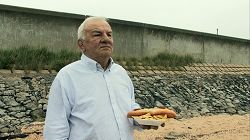

![]()

![]()
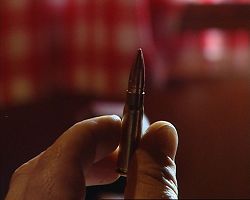

![]()
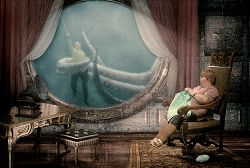
![]()
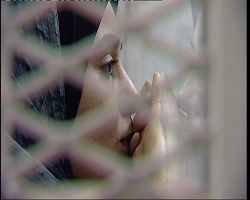
![]()

![]()
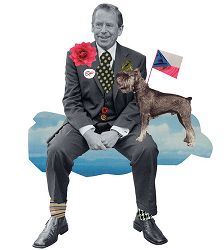
![]()
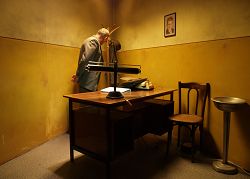
![]()
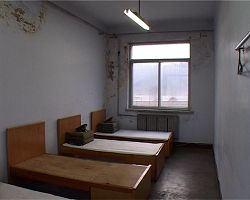
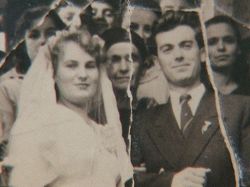
![]()
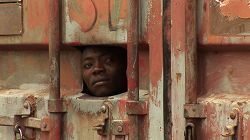
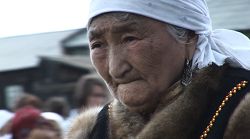
![]()

![]()
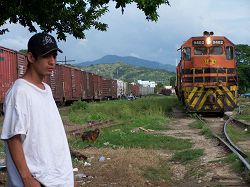
![]()
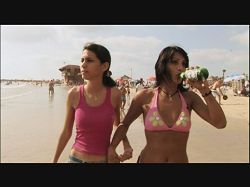
![]()
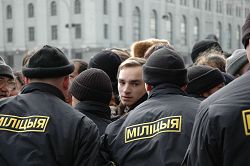
![]()
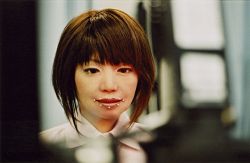
![]()
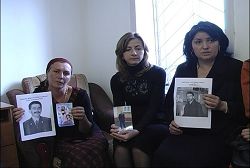
![]()
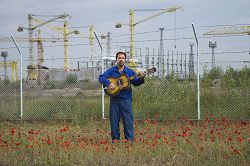
![]()

![]()
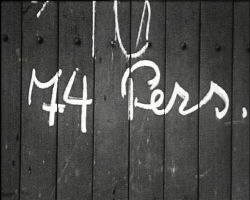


![]()
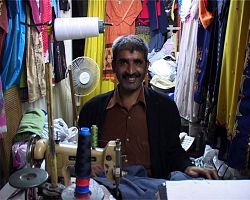
![]()

![]()
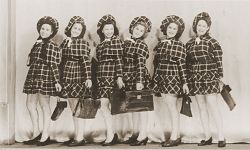
![]()
